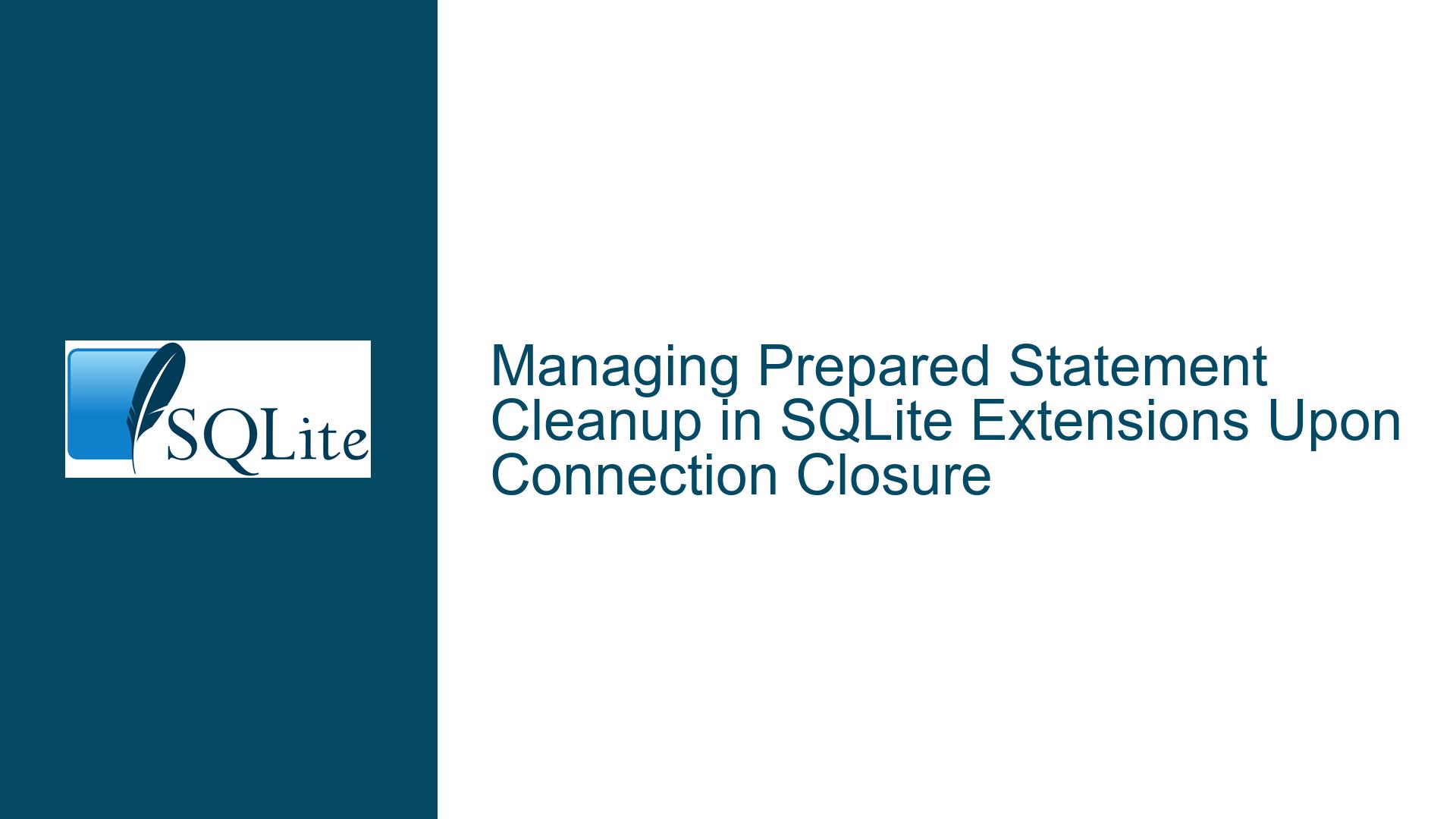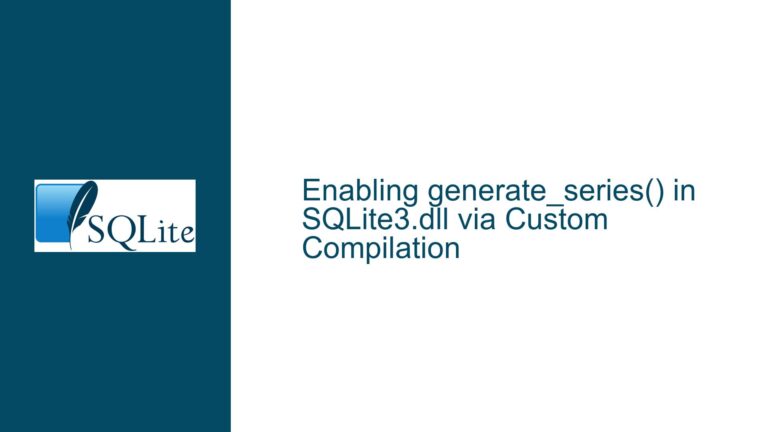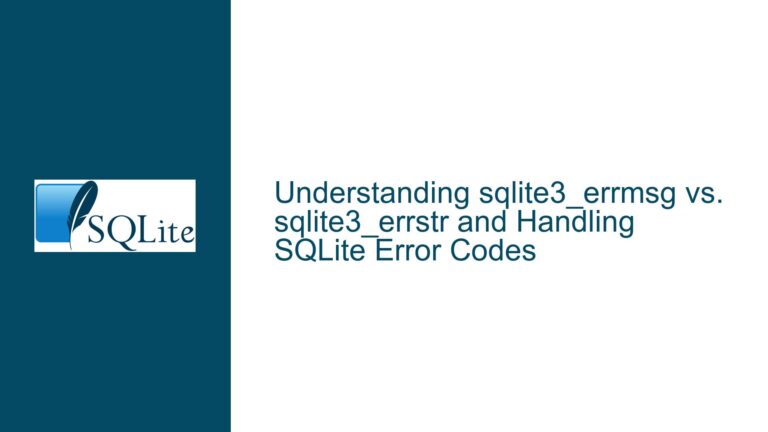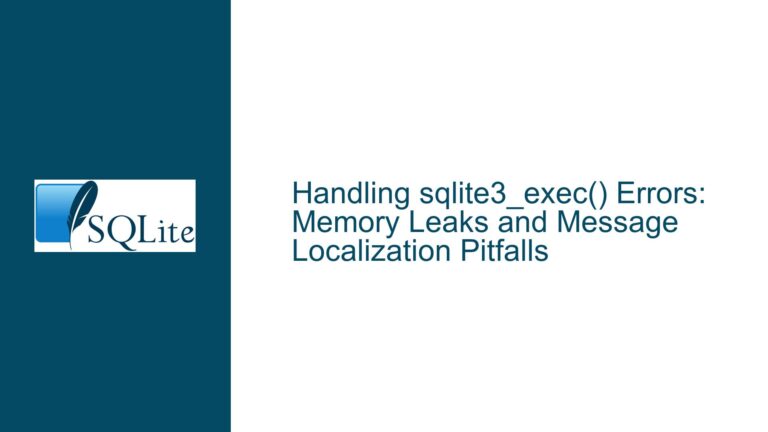Managing Prepared Statement Cleanup in SQLite Extensions Upon Connection Closure
Resource Management Challenges With Persistent Prepared Statements in Custom Functions
The core challenge revolves around managing the lifecycle of prepared SQL statements created within SQLite extensions – particularly those used by custom functions that persist across multiple invocations. When a developer creates a SQLite extension containing user-defined functions that internally prepare and retain SQL statements for reuse, there’s no native mechanism to automatically finalize these statements when the database connection closes. This creates two critical problems:
- Unreleased Resources: Prepared statements not explicitly finalized retain memory and internal database resources until connection termination
- Connection Closure Failures: The sqlite3_close() API call will return SQLITE_BUSY if any statements remain unfinalized, preventing clean connection shutdown
- Language Binding Conflicts: Higher-level language interfaces (like PHP’s SQLite3 module) may implement their own statement management that doesn’t account for extension-created statements
In typical SQLite usage patterns, prepared statements are created, used, and immediately finalized within the same operational scope. However, extensions requiring statement reuse for performance reasons must maintain prepared statement handles across multiple function invocations. This long-lived retention creates a lifecycle management gap – while the extension can initialize statements during connection setup or first function use, there’s no equivalent "destructor" hook to clean them up when the parent connection terminates.
The problem compounds when considering different execution environments. The SQLite CLI normally finalizes statements immediately after execution, but extensions can create persistent statements that outlive individual commands. In PHP, while the SQLite3 class automatically finalizes statements it creates during connection closure, it has no visibility into statements prepared directly through extension functions using the C API.
Architectural Constraints Preventing Automatic Statement Cleanup
Three fundamental aspects of SQLite’s design contribute to this challenge:
1. Connection-Level Resource Ownership Model
SQLite manages resources at the connection level (sqlite3*) without cascading ownership tracking. While sqlite3_close() checks for outstanding statements, it doesn’t differentiate between those created by different components (core API vs extensions). This design assumes all statements are explicitly managed by the same layer that created them.
2. Extension Function Lifetime Binding
Custom functions registered via sqlite3_create_function_v2() can specify an xDestroy callback through the fifth argument. However, this callback triggers when the function definition is destroyed – which occurs before sqlite3_close() checks for outstanding statements. Attempting to finalize statements in xDestroy would create a race condition where:
- xDestroy runs, finalizes statements
- sqlite3_close() then finds no outstanding statements
But in practice, xDestroy isn’t invoked if any statements remain active, as sqlite3_close() aborts early with SQLITE_BUSY.
3. Language Binding Abstraction Layers
Higher-level language interfaces like PHP’s SQLite3 module abstract statement management through their own object models. When a PHP script calls $db->close(), the module iterates through its internal list of SQLite3Result/SQLite3Stmt objects to finalize them. However, statements created directly through extension functions (not through the PHP API) aren’t tracked in these language-level registries. This creates a scenario where:
- PHP believes all statements are finalized
- SQLite’s native API reports unfinalized statements
- Connection closure fails or leaks resources
The interaction between these layers explains why manually iterating through statements with sqlite3_stmt_next() works in pure C environments but fails when dealing with language bindings. The PHP module’s close handler only finalizes statements it created through its own prepare()/query() methods, unaware of extension-managed statements.
Comprehensive Solutions for Statement Lifecycle Management
Strategy 1: Auxiliary Data Registration With Negative Column Indexes
While not officially documented, SQLite’s JSON extension uses negative column indexes in sqlite3_set_auxdata() as a mechanism for persisting prepared statements across function invocations. This approach can be adapted for general extension use:
// During function initialization
static void xFunc(sqlite3_context *ctx, int argc, sqlite3_value **argv) {
sqlite3_stmt **ppStmt = (sqlite3_stmt**)sqlite3_get_auxdata(ctx, -1);
if( !ppStmt ){
sqlite3_prepare_v2(db, "SELECT ...", -1, ppStmt, NULL);
sqlite3_set_auxdata(ctx, -1, *ppStmt, (void(*)(void*))sqlite3_finalize);
}
// Use prepared statement
}
Key Mechanism:
- Uses sqlite3_set_auxdata() with column index -1 to store statement pointer
- Registers sqlite3_finalize as the destructor callback
- Auxdata persists for the lifetime of the outer query, not the connection
Advantages:
- Automatic finalization when outer query completes
- No need for connection-level tracking
- Compatible with PHP and CLI environments
Limitations:
- Requires re-preparing statements for each new outer query
- Negative indexes are undocumented implementation details
- Not suitable for cross-connection statement reuse
Strategy 2: Connection-Specific Statement Registry
Create an extension-managed global registry that maps sqlite3* connections to their associated prepared statements. This requires:
Connection Open Hook:
Register an sqlite3_update_hook() to track connection creation/destructionStatement Tracking:
Maintain a thread-safe hash table mapping connections to statement lists
static int xConnectHook(void *pArg, sqlite3 *db, const char *zDb, const char *zName, const char **pzErr){
// Add new connection to registry
add_connection_to_registry(db);
return SQLITE_OK;
}
static void xDestroyHook(void *pArg, sqlite3 *db){
// Finalize all statements for this connection
finalize_connection_statements(db);
remove_connection_from_registry(db);
}
// During statement preparation in custom function
sqlite3_stmt *pStmt = NULL;
sqlite3_prepare_v2(db, "SELECT ...", -1, &pStmt, NULL);
register_statement_with_connection(db, pStmt);
Implementation Notes:
- Must handle multi-threaded environments
- Requires careful synchronization between registry and actual connection state
- Needs explicit registration of all extension-created statements
PHP Integration:
- Wrap SQLite3::close() in a PHP extension override:
class ExtendedSQLite3 extends SQLite3 {
public function close() {
$this->exec("SELECT myextension_finalize()");
parent::close();
}
}
- The myextension_finalize() SQL function triggers C-level registry cleanup
Strategy 3: Forced Finalization via sqlite3_stmt_next()
When direct control over connection closure is available (e.g., in custom C code), iterate through all outstanding statements:
void finalize_all_statements(sqlite3 *db) {
sqlite3_stmt *pStmt;
while( (pStmt = sqlite3_next_stmt(db, NULL))!=0 ){
sqlite3_finalize(pStmt);
}
}
// Before closing connection
finalize_all_statements(db);
sqlite3_close(db);
Challenges in PHP:
- PHP’s SQLite3 class doesn’t expose sqlite3_next_stmt()
- Requires custom PHP extension wrapping:
PHP_FUNCTION(sqlite_finalize_all) {
zval *db_handle;
sqlite3 *db;
if (zend_parse_parameters(ZEND_NUM_ARGS(), "r", &db_handle) == FAILURE) {
RETURN_NULL();
}
if ((db = php_sqlite3_get_db_ptr(db_handle)) == NULL) {
php_error_docref(NULL, E_WARNING, "Invalid SQLite3 Database Resource");
RETURN_FALSE;
}
sqlite3_stmt *pStmt;
while( (pStmt = sqlite3_next_stmt(db, NULL)) != NULL ){
sqlite3_finalize(pStmt);
}
RETURN_TRUE;
}
- Expose this function to PHP scripts for manual invocation
Strategy 4: Statement Caching with sqlite3_prepare_v3()
Though the official SQLite trunk doesn’t enable statement caching by default, extensions can leverage the prepare_v3 API with SQLITE_PREPARE_PERSISTENT:
sqlite3_prepare_v3(
db,
"SELECT ...",
-1,
SQLITE_PREPARE_PERSISTENT,
&pStmt,
NULL
);
Cache Management:
- SQLite maintains an internal LRU cache of prepared statements
- Automatically reuses statements when possible
- Finalization occurs when cache limits are exceeded
Current Limitations:
- As of SQLite 3.41.0, the cache isn’t enabled by default
- Requires manual cache size configuration via sqlite3_limit(db, SQLITE_LIMIT_STMT_CACHE_SIZE, …)
- May not provide deterministic finalization timing
Hybrid Approach for Cross-Platform Reliability
For extensions targeting both native and PHP environments, combine multiple strategies:
- Use Auxiliary Data Binding for statements used within single queries
- Maintain Connection Registry for cross-query statements
- Expose PHP Finalization Method via custom SQL function
- Implement Automatic Cleanup on connection close via override
Sample implementation outline:
C Extension Code:
// Connection tracking
static sqlite3_auto_extension((void*)register_extension);
static void register_extension(void){
sqlite3_auto_extension((void*)register_connection_hooks);
}
static void register_connection_hooks(sqlite3 *db){
sqlite3_create_function_v2(db, "myextension_finalize", 0, SQLITE_UTF8, db,
myextension_finalize_func, 0, 0, destroy_connection_state);
}
static void destroy_connection_state(void *pArg){
sqlite3 *db = (sqlite3*)pArg;
sqlite3_stmt *pStmt;
while( (pStmt = sqlite3_next_stmt(db, NULL)) ){
if(is_extension_statement(pStmt)){
sqlite3_finalize(pStmt);
}
}
}
// PHP Override Class
zend_class_entry *extended_sqlite3_ce;
PHP_METHOD(ExtendedSQLite3, close) {
sqlite3 *db = php_sqlite3_get_db_ptr(getThis());
if(db){
sqlite3_exec(db, "SELECT myextension_finalize()", NULL, NULL, NULL);
}
parent_close(getThis());
}
PHP Usage:
$db = new ExtendedSQLite3(':memory:');
$db->enableExtension(true);
// Use extension functions...
$db->close(); // Automatically finalizes extension statements
Performance Considerations
Statement Reuse vs Preparation Overhead:
- Balance between keeping statements open (faster execution) and frequent preparation (lower memory)
- Benchmark with typical use cases to determine optimal caching strategy
Memory Leak Detection:
- Use SQLITE_CONFIG_LOG to track unfinalized statements
- Enable SQLITE_DEBUG_MEMORY_INTEGRATION in debug builds
Concurrency Handling:
- Ensure thread safety when using global statement registries
- Use SQLITE_OPEN_NOMUTEX or SQLITE_OPEN_FULLMUTEX appropriately
Cross-Version Compatibility
Handle different SQLite versions through feature detection:
#if SQLITE_VERSION_NUMBER >= 3024000
#define HAVE_PREPARE_V3 1
#else
#define HAVE_PREPARE_V3 0
#endif
void prepare_statement(sqlite3 *db, const char *sql, sqlite3_stmt **ppStmt) {
#if HAVE_PREPARE_V3
sqlite3_prepare_v3(db, sql, -1, SQLITE_PREPARE_PERSISTENT, ppStmt, NULL);
#else
sqlite3_prepare_v2(db, sql, -1, ppStmt, NULL);
#endif
}
Debugging Techniques
Track Outstanding Statements:
SELECT * FROM sqlite_stmt('main');Monitor Connection State:
Register an sqlite3_trace_v2() callback with SQLITE_TRACE_STMT:sqlite3_trace_v2(db, SQLITE_TRACE_STMT, [](unsigned mask, void *ctx, void *p, void *x){ if( mask & SQLITE_TRACE_STMT ){ sqlite3_stmt *pStmt = (sqlite3_stmt*)p; printf("Statement %p: %s\n", pStmt, sqlite3_sql(pStmt)); } return 0; }, NULL);Force Early Finalization:
Periodically call cleanup functions during development:sqlite3_db_release_memory(db); // May finalize cached statements
Best Practices for Extension Developers
Explicit Finalization API:
Always provide users with a clear way to trigger cleanup, even if automatic mechanisms existDocumentation Warnings:
Clearly state in extension documentation that manual finalization may be required in certain environmentsConnection Pooling Awareness:
If connections are reused (common in web apps), ensure statements don’t persist beyond logical transaction boundariesMemory Limits:
Use sqlite3_soft_heap_limit64() to prevent runaway memory growth from unfinalized statementsTesting Matrix:
Validate extension behavior across:- Different SQLite versions
- Various language bindings (PHP, Python, etc.)
- Connection close scenarios (normal vs abrupt termination)
By combining these strategies with rigorous lifecycle management, extension developers can achieve both the performance benefits of persistent prepared statements and reliable resource cleanup across all deployment environments.






